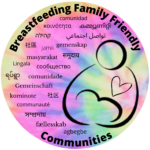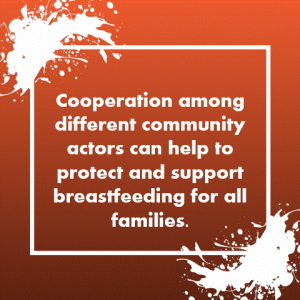What are you working on right now?
In the second article, Breastfeeding Family Friendly Communities share the projects and events that they are working on now and the lessons that they have learned. In celebration of World Breastfeeding Week and National Breastfeeding Month, we are excited to continue to share feedback from Breastfeeding Family Friendly Communities. Question One of this four-part series was Moving Through Challenges. We learned about the two most pressing challenges – COVID-19 and Time. In the second question, the responses again revealed the determination and resourcefulness to move forward of each Breastfeeding Family Friendly Community.
The responses to this question revealed both the similarities in focus of the communities and their unique needs. Breastfeeding Family Friendly Community implementation teams represent a wide range of community organizations, agencies, and individual community members, which is reflected in the current work. All of the work is important to the transformation of the community.
Equity
Communities recognize the inequities in breast/chestfeeding support and are working to mitigate or remove those inequities in all aspects of community life.
- Looking at gaps in care for LGBTQ+ human milk feeding families.
- Supporting and amplifying the work already in the community. “Members of our Black Maternal Health Community are working on amazing projects.”
- Launching virtual breast/chestfeeding support groups led by and for Black women. “We sent four people to The B.L.A.C.K. Course, and when they return, they’ll form a team to moderate the support groups.”
- Conducting statewide surveys of pregnant and postpartum parents earlier this year. “…Mental Health Support, Lactation Support, and Doula Support turned up as top needs indicated by parents. So we’re attempting to map those providers in our region.”
- Learning to think about more than milk, to think about the whole family, and to think about the family as children grow.
- Moving into the role of promotion of the work already being done.
Awareness
Communities are building awareness during World Breastfeeding Week and National Breastfeeding Month.
- Celebrating partnerships between State agencies and local community stakeholders (e.g., State WIC office and local baseball team to get a Mamava POD at the stadium)
- Kicking off local Breastfeeding Family Friendly Community designation projects that were canceled in 2020 due to the pandemic.
- Working on a position statement and video for World Breastfeeding Week, collaborating with two other local maternal health organizations, around the WABA theme of Shared Responsibility.
- Planning a photoshoot.
- Relaunching the county breastfeeding coalition and engaging a key decision maker, the County Commissioner, who will be announcing a proclamation to support breastfeeding during World Breastfeeding Week. Additionally, a local media outlet will be spotlighting the event and providing people the opportunity to share their breast/chestfeeding stories in an editorial
Collective action
August events are only the beginning of the outreach.
- Collective action/alignment feels good, and it helps to share work and resources. It’s also more fun to collaborate!
- We are working on how to not do it all, while still making sure that the month is rich with events. Right now we have more stress than success.
- Building Support: Communities are finding ways to create breastfeeding friendly spaces for families so that families can feel welcomed and receive support to meet their infant/young child feeding goals.
- Providing technical assistance to healthcare centers and offices to achieve the State breastfeeding coalition clinic designation
Education
Education and awareness-building go a long way to building support, and our communities are supportive.
- Creating local “breastfeeding friendly child care” designations with resources and technical assistance to support child care programs to become breastfeeding friendly. Communities are collaborating with their local Health Departments to make this happen.
- Getting child care programs to engage has been a challenge; however, the team moved forward with the designation and are ready when child care programs are ready to engage.
Breastfeeding Family Friendly Communities to continue the work through the challenges. They are discovering new roles in the community and building partnerships within the community.
In the next post, we will share short-term goals of the different communities.

